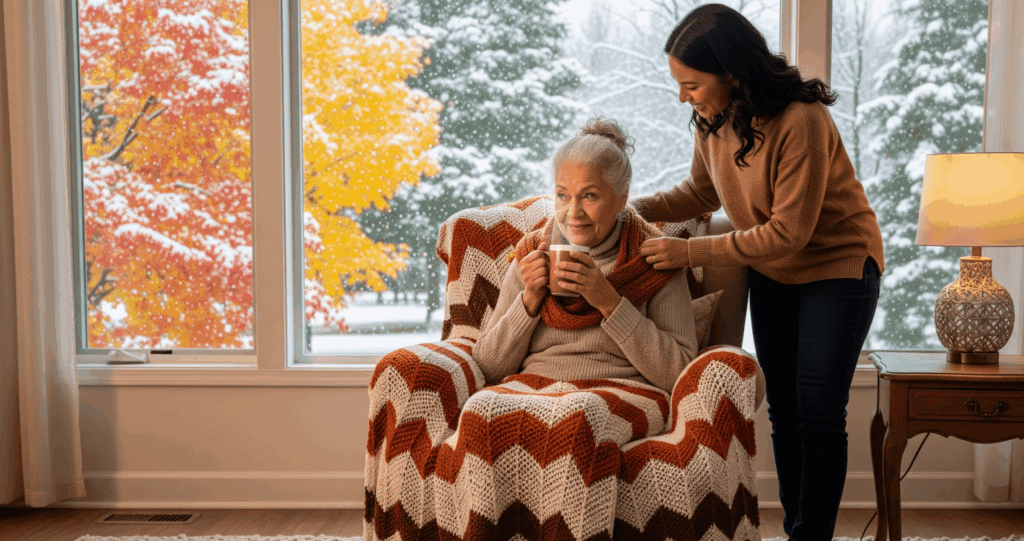
As the leaves change and the temperature drops, so do the risks for seniors living at home.
While fall and winter bring cozy moments, holiday traditions, and seasonal beauty, they also come with slippery sidewalks, cold-weather illnesses, and home heating hazards. For aging adults—especially those living alone or managing chronic conditions—these seasons require extra planning and care.
Here’s how to help your aging loved ones stay safe, warm, and well-cared-for during the colder months, starting today.
1. Dress for the Weather—Indoors and Out
Even a mild cold snap can pose a risk to seniors, who may have slower circulation or reduced sensitivity to temperature.
✅ What to do:
- Encourage layering with easy-to-remove clothing
- Use thermal socks, gloves, and fleece jackets
- Keep a warm blanket in each frequently used room
- Make sure heating systems are working—and safe!
🧤 Pro tip: Remind seniors to wear sturdy, weather-appropriate shoes with non-slip soles for outdoor errands.
2. Support Immune Health with Smart Nutrition
Colds, flu, and respiratory illnesses spike during fall and winter—and seniors are especially vulnerable. A strong immune system starts with what’s on the plate.
✅ What to do:
- Offer warm, nutritious meals high in vitamins C & D
- Hydrate with warm teas, broths, and soups
- Limit processed foods and excess sugar
- Supplement with doctor-approved vitamins if needed
Warm food doesn’t just nourish the body—it’s comforting for the soul too.
3. Prevent Home Heating Hazards
Space heaters, fireplaces, and electric blankets can be cozy—but also dangerous if left unattended or misused.
✅ What to do:
- Use UL-certified space heaters with auto shut-off
- Keep heaters at least 3 feet from curtains and bedding
- Install or test smoke and carbon monoxide detectors
- Schedule an HVAC or chimney inspection in early fall
🔥 If your loved one is forgetful, it’s safer to rely on central heating or thermostat-controlled systems.
4. Plan for Icy Walkways and Storms
Slips on ice are one of the leading causes of winter injuries in older adults—and many can be prevented.
✅ What to do:
- Apply salt or sand to steps and driveways
- Keep entryways well-lit
- Arrange for snow shoveling or outdoor maintenance
- Create an emergency storm plan (flashlights, meds, blankets, food)
And don’t forget: driving in winter weather is dangerous—consider arranging transportation for errands or appointments.
5. Check In Often or Arrange In-Home Help
As the days get shorter and mobility becomes harder, isolation and depression can also become real risks. That’s where companionship and routine check-ins make a difference.
✅ What to do:
- Set up regular family calls or visits
- Arrange for home care services that include wellness checks, medication reminders, and companionship
- Help your loved one stay connected with their community
At Rivers of Hope, our caregivers are trained to help seniors through all seasons—physically and emotionally.
Ready for Peace of Mind This Season?
With just a few proactive steps, you can make fall and winter safe and enjoyable for your aging loved one. Whether it’s warm meals, safe stairs, or in-home care support, a little planning can go a long way.
Need help? We offer seasonal safety assessments and daily caregiving services to support families just like yours.
Call us and schedule a free care consultation today.




